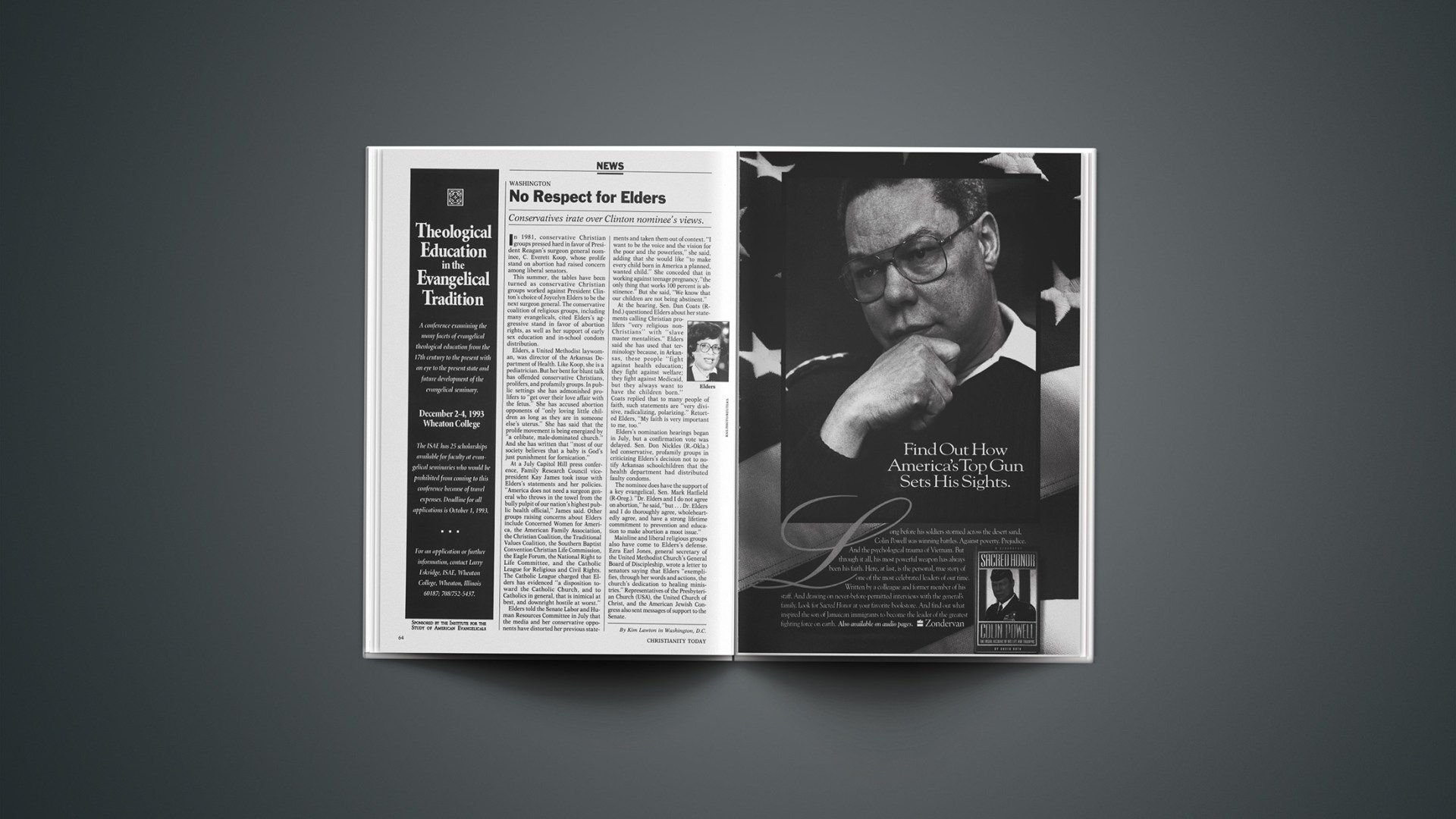Conservatives irate over Clinton nominee’s views.
In 1981, conservative Christian groups pressed hard in favor of President Reagan’s surgeon general nominee, C. Everett Koop, whose prolife stand on abortion had raised concern among liberal senators.
This summer, the tables have been turned as conservative Christian groups worked against President Clinton’s choice of Joycelyn Elders to be the next surgeon general. The conservative coalition of religious groups, including many evangelicals, cited Elders’s aggressive stand in favor of abortion rights, as well as her support of early sex education and in-school condom distribution.
Elders, a United Methodist laywoman, was director of the Arkansas Department of Health. Like Koop, she is a pediatrician. But her bent for blunt talk has offended conservative Christians, prolifers, and profamily groups. In public settings she has admonished prolifers to “get over their love affair with the fetus.” She has accused abortion opponents of “only loving little children as long as they are in someone else’s uterus.” She has said that the prolife movement is being energized by “a celibate, male-dominated church.” And she has written that “most of our society believes that a baby is God’s just punishment for fornication.”
At a July Capitol Hill press conference, Family Research Council vice-president Kay James took issue with Elders’s statements and her policies. “America does not need a surgeon general who throws in the towel from the bully pulpit of our nation’s highest public health official,” James said. Other groups raising concerns about Elders include Concerned Women for America, the American Family Association, the Christian Coalition, the Traditional Values Coalition, the Southern Baptist Convention Christian Life Commission, the Eagle Forum, the National Right to Life Committee, and the Catholic League for Religious and Civil Rights. The Catholic League charged that Elders has evidenced “a disposition toward the Catholic Church, and to Catholics in general, that is inimical at best, and downright hostile at worst.”
Elders told the Senate Labor and Human Resources Committee in July that the media and her conservative opponents have distorted her previous statements and taken them out of context. “I want to be the voice and the vision for the poor and the powerless,” she said, adding that she would like “to make every child born in America a planned, wanted child.” She conceded that in working against teenage pregnancy, “the only thing that works 100 percent is abstinence.” But she said, “We know that our children are not being abstinent.”
At the hearing, Sen. Dan Coats (R-Ind.) questioned Elders about her statements calling Christian prolifers “very religious non-Christians” with “slave master mentalities.” Elders said she has used that terminology because, in Arkansas, these people “fight against health education; they fight against welfare; they fight against Medicaid, but they always want to have the children born.” Coats replied that to many people of faith, such statements are “very divisive, radicalizing, polarizing.” Retorted Elders, “My faith is very important to me, too.”
Elders’s nomination hearings began in July, but a confirmation vote was delayed. Sen. Don Nickles (R.-Okla.) led conservative, profamily groups in criticizing Elders’s decision not to notify Arkansas schoolchildren that the health department had distributed faulty condoms.
The nominee does have the support of a key evangelical, Sen. Mark Hatfield (R-Oreg.). “Dr. Elders and I do not agree on abortion,” he said, “but … Dr. Elders and I do thoroughly agree, wholeheartedly agree, and have a strong lifetime commitment to prevention and education to make abortion a moot issue.”
Mainline and liberal religious groups also have come to Elders’s defense. Ezra Earl Jones, general secretary of the United Methodist Church’s General Board of Discipleship, wrote a letter to senators saying that Elders “exemplifies, through her words and actions, the church’s dedication to healing ministries.” Representatives of the Presbyterian Church (USA), the United Church of Christ, and the American Jewish Congress also sent messages of support to the Senate.
By Kim Lawton in Washington, D.C.










